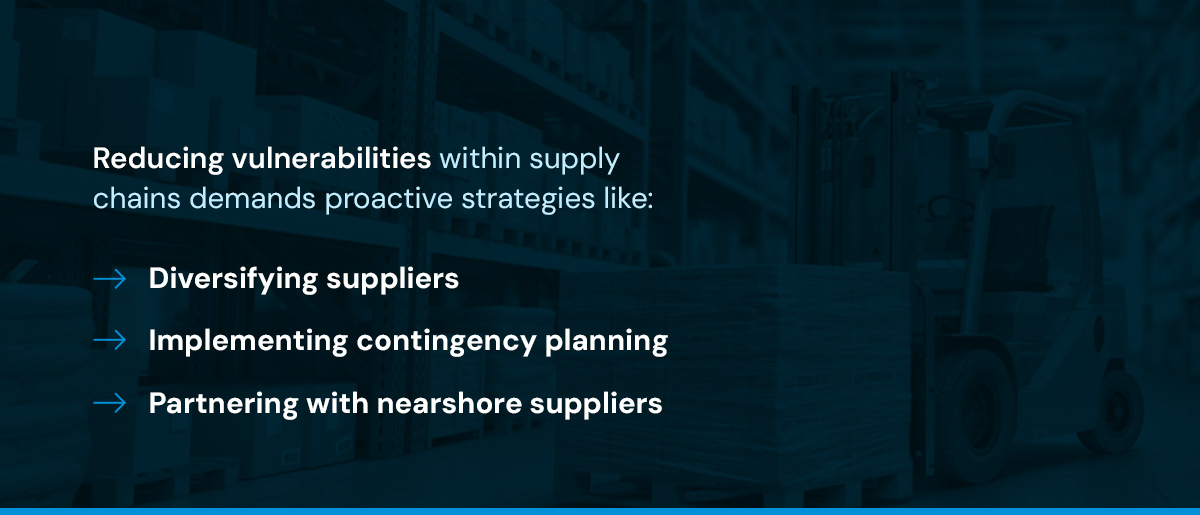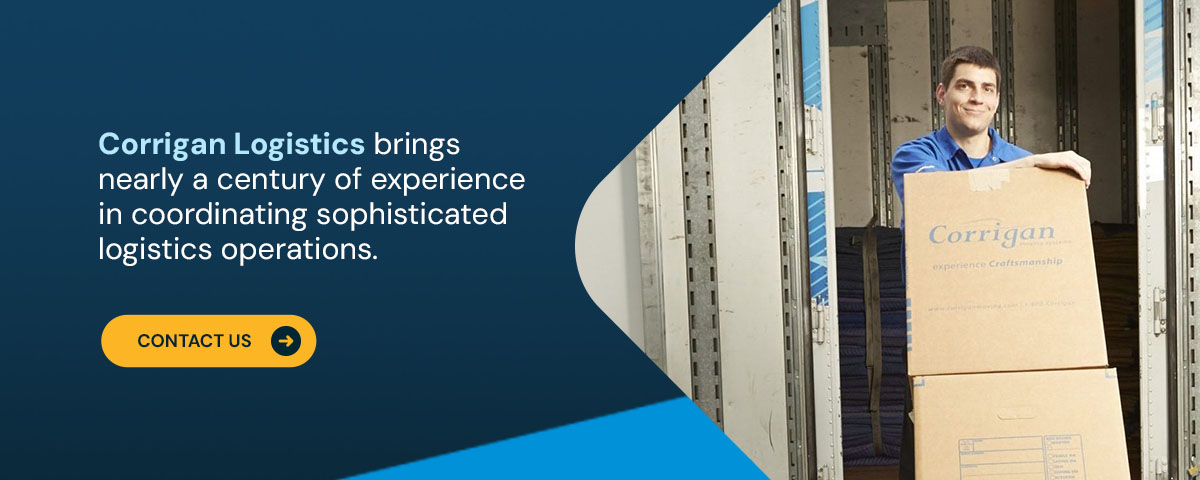Disruptions are unavoidable in logistics, making risk management critical to business operations and success. Forward-thinking companies must be prepared to tackle hiccups across the supply chain, maintain compliance with evolving regulations and safeguard valuable cargo throughout its journey to maintain profitability and customer trust. Let’s explore some key aspects of risk management in logistics, including strategies you can implement to anticipate and reduce risks.
Explore Comprehensive Logistics Solutions
Understanding Risk Management in Logistics
Risk management involves identifying, analyzing, and addressing factors that could interrupt the flow of goods, and it facilitates business adaptability and continuity.
Importance of Risk Management in Logistics Operations
Knowing how to strategically reduce risk in logistics yields significant business advantages, including:
- Preserving business continuity: Risk management allows companies to respond swiftly and maintain service.
- Enhancing operational efficiency: Anticipating threats and preparing actionable contingency plans allows enterprises to maintain steady production and service levels amid interruptions.
Common Risks in Logistics
Identifying risks in logistics is the first step in developing an effective risk mitigation plan. Some notable challenges include:
- Transportation delays: Unexpected events such as accidents, mechanical breakdowns, traffic congestion, severe weather or infrastructure issues can disrupt delivery schedules, resulting in financial losses and strained customer relationships.
- Regulatory noncompliance: Violating local or international regulatory standards may lead to fines, delays, product recalls or harm to your brand image.
- Security breaches in cargo handling: Unauthorized access during storage or transit can compromise product integrity, cause financial losses and damage customer confidence.
Supply Chain Disruptions
Modern supply chains are complex networks susceptible to internal and external disturbances. Preparing for these interruptions helps mitigate potential damages and maintain steady operations.
Causes of Supply Chain Disruptions
Catastrophic supply chain interruptions often originate from unpredictable external factors such as:
- Natural disasters: Events like hurricanes, tsunamis, floods, tornadoes, wildfires or earthquakes can severely impair infrastructure, disrupt transportation routes and halt production lines.
- Geopolitical events: Trade conflicts, international tensions and policy shifts can significantly alter supply chain stability. For instance, the tariffs implemented between China and the United States have escalated international trade complexities, impacting trade routes, pricing and availability of certain goods.
Strategies to Mitigate Supply Chain Risks
Reducing vulnerabilities within supply chains demands proactive strategies like:

- Supplier diversiication: Relying on a single supplier can be risky. By building relationships with multiple vendors across diverse regions, businesses can reduce the chances of a major disruption if one supplier fails to deliver.
- Implementing contingency planning: A comprehensive contingency plan outlines specific actions to take in response to various disruptions. It helps logistics companies quickly adapt to changing circumstances and maintain supply chain continuity.
- Partnering with nearshore suppliers: Working with suppliers geographically closer to your operational centers can reduce transportation times and risks associated with global shipping.
Compliance Standards in Logistics
Strict compliance with relevant standards protects logistics companies from legal, regulatory and financial pitfalls. It also reinforces your supply chain’s integrity.
Key Compliance Requirements
Navigating complex regulatory landscapes involves adherence to critical standards, such as:
- Industry-specific regulations: Certain industries, including pharmaceuticals, electronics and food, have strict guidelines governing the transport, storage and recall of goods. Companies must stay abreast of these standards to avoid fines and ensure the safety and quality of their products.
- Environmental standards: Logistics firms must comply with environmental regulations that govern emissions, waste disposal and sustainability practices. Adhering to these standards helps minimize the environmental impact of logistics activities and enhances a company’s reputation for corporate social responsibility.
Ensuring Compliance
Some measures that support continuous compliance include:
- Regular audits and training: Frequent assessments and comprehensive training enable employees to understand and adhere consistently to compliance obligations, reducing the likelihood of violations.
- Leveraging technology for compliance tracking: Deploying specialized software solutions to track, manage and report compliance measures provides greater accuracy, transparency and ease of management.
Cargo Security Strategies
Effective security measures guard against common threats that may compromise shipments:
- Theft: Theft remains a persistent threat during transport and storage, especially for high-value items. Criminal activities can result in substantial financial damage.
- Tampering: Unauthorized access or manipulation of shipments, particularly sensitive or regulated items like pharmaceuticals, can degrade product safety and violate compliance standards.
Best Practices for Cargo Security
Logistics professionals can utilize proven security measures to counter cargo threats, including:
- GPS tracking and surveillance systems: Advanced tracking tools provide real-time visibility into cargo movements, immediately flagging any anomalies or deviations.
- Proper documentation and secure packaging: Ensuring that shipments have complete, accurate documentation and secure, tamper-evident packaging mitigates the risk of tampering and enables rapid response in case of a breach.
Fleet Risk Management
Efficient fleet management is critical — it improves reliability and customer satisfaction and reduces operational expenses.
Identifying Fleet Risks
Fleet management involves identifying risks that could affect transportation operations:
- Vehicle breakdowns: Unexpected mechanical failures can cause delivery delays and increased maintenance costs.
- Driver safety issues: Accidents caused by lapses in training, driver negligence or fatigue can lead to injury, property damage and delivery disruptions.
Mitigation Techniques for Fleet Risks
Implementing proactive measures can significantly minimize fleet-related concerns:
- Regular maintenance schedules: Establishing planned maintenance routines extends vehicle lifespan and reduces the probability of unexpected breakdowns.
- Driver training programs: Comprehensive training programs help drivers adopt safe driving practices and better manage adverse situations. They substantially reduce accident rates and related disruptions.
Warehouse Safety Measures
Warehouses are critical points within the logistics network. They demand strict safety protocols to maintain efficiency and protect employees and assets.
Common Warehouse Risks
Warehouse operations commonly face risks such as:
- Workplace injuries: Slips, trips, falls, forklift accidents or improper handling can cause significant personnel injuries, reducing productivity and morale and leading to legal complexities.
- Equipment malfunctions: Failures in critical warehouse equipment, such as conveyor belts or automated sorting systems, can create safety hazards and disrupt inventory handling and order fulfillment.
Implementing Safety Protocols
Developing and instituting robust safety protocols is vital in warehouse risk management. Effective practices include employee safety training and emergency response planning. Ongoing training programs ensure warehouse staff adhere to best practices, recognize hazards and safely operate equipment. Similarly, well-articulated response plans prepare teams to act swiftly in unexpected situations, minimizing downtime and damage.
Project Management in Logistics Risk Mitigation
Integrating effective project management practices is essential to mitigating logistics risks.
Role of Project Management in Risk Mitigation
Comprehensive project management enhances logistics resilience by:
- Coordinating multiple stakeholders: Project management fosters collaboration and minimizes miscommunication by aligning the efforts of all involved parties, including suppliers, carriers and clients.
- Monitoring risk mitigation progress: Continuous evaluation of risk management strategies helps businesses adapt to changing threats and refine operational procedures.
Tools for Effective Project Management
Leveraging modern tools can transform how your business manages risk across projects:
- Project management software: Effective project management platforms allow logistics teams to streamline planning, track progress, maintain transparency and identify real-time risks.
- Analytics and reporting tools: Analytics and reporting tools enable project managers to pinpoint vulnerabilities, track performance metrics and refine mitigation strategies through data-driven insights.
How Corrigan Logistics Can Help
By adopting comprehensive risk management strategies such as supplier diversification, fleet maintenance, safety training and technology in cargo security, logistics companies can navigate unforeseen challenges, protect their supply chain and promote long-term operational success.
When specialized expertise is necessary to navigate complex logistics challenges, partnering with a seasoned leader can offer substantial advantages. Corrigan Logistics brings nearly a century of experience in coordinating sophisticated logistics operations. We understand the complexities of logistics threats and are well-equipped to help you reduce risks and enhance your supply chain resilience. Contact us today to optimize logistics operations and protect your business from potential disruptions.




